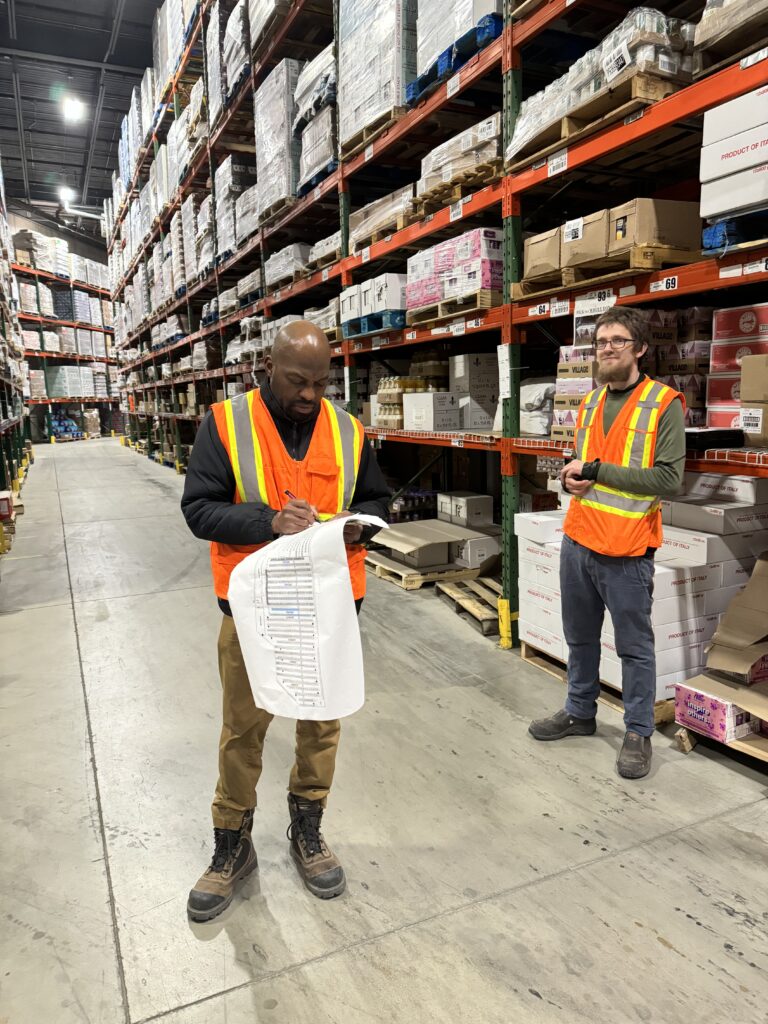Safety inspections serve as the backbone of warehouse operations, protecting workers and preventing costly incidents. With Canada’s updated 2025 building codes, including revisions to CSA A344 and the National Building Code of Canada (NBCC), warehouse owners face stricter requirements for their racking systems.
These changes affect engineers, facility managers, contractors, and warehouse owners across the country. The updated regulations aim to enhance workplace safety through improved structural standards and compliance tracking. Canadian Rack Technologies Inc. stands ready to help you navigate these new requirements with expert, code-compliant racking solutions.

What’s New in the 2025 Canadian Building Code for Warehouses?
The 2025 updates introduce significant changes to warehouse safety standards. Stricter load capacity and anchoring requirements now demand more robust installation methods. New height and spacing standards ensure better stability and access throughout your facility.
Updated seismic compliance affects warehouses in certain regions, requiring enhanced structural resilience. Perhaps most notably, mandatory documentation and compliance tracking mean you must maintain detailed records of all safety measures and warehouse safety inspections in Canada.
Key Areas Safety Inspectors Will Focus On in 2025
Rack Anchoring
The 2025 code enforces proper anchoring of uprights to the floor with updated strength, spacing, and seismic resistance standards. Anchor bolts must meet these new requirements, making professional installation and inspection of anchor connections essential for compliance.
Load Capacity Labels
Clearly visible and accurate load capacity labels are now mandatory on every storage rack. The new code sets specific expectations for label durability and placement. Missing or outdated labels can result in fines and increase the risk of dangerous overload incidents.
Beam Deflection & Upright Condition
Inspectors will examine visible deflection, bending, rust, and impact damage using new code thresholds for acceptable deflection. These standards directly relate to rack safety, making routine inspection and replacement of damaged components crucial.
Spacing and Aisle Widths
Updated minimum aisle width requirements prioritize forklift and pedestrian safety. New spacing rules around warehouse racking racks prevent tipping, congestion, and blocked exits. Non-compliance can create obstructed emergency access and increase accident risks.
Pallet Condition & Compatibility
Poor pallet condition has become a new focal point for safety inspections. Broken, oversized, or incompatible pallets can damage beams or shift loads unexpectedly. Warehouses should establish pallet inspection protocols and avoid mixing different pallet types.
Integrating Fire Safety into the Warehouse
Fire protection is essential for preserving warehouse value, speeding up leasing processes, and ensuring operational safety. The evolving fire codes and insurance standards in 2025 demand proactive planning from all stakeholders.
Brokers, tenants, and landlords must recognize that fire code-compliant buildings attract tenants faster and lease more easily. Planning fire code compliance early—especially during expansion or relocation—prevents costly delays. Tenant racking plans must meet local fire codes, as non-compliance can impact building insurability, increase liability, and affect long-term property value.
Up-to-Date PSR or Original Engineering Documents
All racking systems must be accompanied with a PSR report that reflects the current layout of the pallet racking (for used or adjusted racking) or an engineer’s report and drawings/ manufacture’s PSR exemption letter (when racking was purchased new).
These documents must detail the system from its original installation date, considering no changes, adjustments, or modifications have been made to the system since the original installation.
Safety Checklist for Warehouse Planners Under the 2025 Code
Follow this warehouse racking inspection checklist to ensure your warehouse is compliant with the 2025 Building Code.
Review Your Current Racking System
Verify the safety of your warehouse racking system by checking for outdated or damaged components like beams, uprights, and connectors. Ensure your racking design meets new code standards for structural integrity and spacing. Verify that layout and anchoring follow updated seismic and load-bearing regulations.
Schedule a Professional Inspection
Certified racking inspectors familiar with the 2025 building code are essential. Canadian Rack Technologies offers expert racking inspection and safe racking installation, helping businesses meet 2025 Ontario building code compliance standards with confidence and precision.
Get a Load Capacity Assessment
Recalculate rack load limits under new code formulas. Ensure clearly posted and accurate capacity labels per updated regulations. Overloading can cause collapse and lead to serious legal or safety issues.
Train Your Staff on New Safety Protocols
Team members must understand the 2025 code-based procedures for loading, inspections, and emergency access. Ongoing training and refresher courses maintain awareness and compliance.
Keep Inspection Records Organized
The 2025 codes require documentation for audits and insurance validation. Maintain organized, up-to-date records of all safety measures and inspections.
Ensure Fire Code Readiness
Review the flue spacing requirement and in-rack sprinkler requirements, and check sprinkler system compatibility. Make sure to obtain AHJ approval, verify insurance compliance, and submit plans and documents for permitting.
Why Non-Compliance Could Be Costly
Non-compliance with the updated codes can result in fines or legal action from provincial inspectors. More seriously, it increases the risk of injury or warehouse downtime. Insurance companies may impose higher premiums or deny claims for non-compliant facilities.
Secure Your Warehouse’s Future with Canadian Rack Technologies
The updated Canadian Building Code significantly impacts racking systems and warehouse safety inspections. Your best bet is to create an action plan now: schedule inspections, plan necessary upgrades, train staff on new protocols, and organize documentation systems.
Working with an experienced warehouse racking installation company like Canadian Rack Technologies Inc. ensures expert support throughout this transition.
Don’t wait for an inspection to reveal compliance gaps. Put warehouse safety first with our code-compliant racking solutions. Contact us today to learn more about our warehouse storage solutions in Canada.
